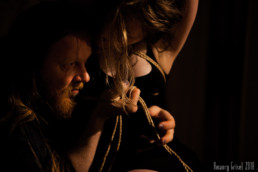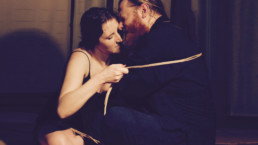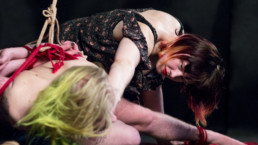Dear Barkas, how did you get started with shibari?
I saw the facial expressions of a close person and was mesmerized. I wanted to be able to create such facial expression and a week later I signed up for a beginner workshop. Ever since then I am into tying more than anything else.
What is your approach to shibari?
It is hard to say. I don’t think I have one explicit approach to Shibari. Like everyone is different and unique, I try to tie with everyone in a way that suits them and us. If I had to boil it down, I would say, that my approach is a very communicative one that draws from more than just patterns and aesthetics. I tie because I want to get to know the other person. Knowing as in getting an understanding of what moves them.
I tie because I want to get to know the other person. Knowing as in getting an understanding of what moves them.
Barkas

Tell us about a constant that keeps you coming back to shibari?
It is the single most interesting field I have encountered. No other practice in my life was so diverse and had room for so many perspectives as Shibari is.
Who are or what are you inspired by from practicing shibari?
I try to draw my inspiration from an as far as possible range of different fields. As for Shibari people, there is of course my teacher Yukimura Haruki. The other person that I draw inspiration from in Shibari is Pilar. I don’t know her teachings or her approaches but watching her and talking to her made me questioning the dimensionality of rope itself.
Other inspirations are for sure several philosophers of the French poststructuralist tradition (Derrida, Barthes, Bachelard, Lyotard) as well as some phenomenologists such as Judith Butler and Sara Ahmed.
Architecture is a great inspiration as well as nature itself.
How do you continue to challenge yourself, within the frame of shibari, as it grows in popularity and attention?
My way of practicing and teaching Shibari is to embed it in a greater context. I am constantly surprised how much there is that haven’t been thought of yet. My way of challenging myself is to constantly question myself. What is it that I might see from a less ideal angle? And to learn from that reflection.
My way of practicing and teaching Shibari is to embed it in a greater context. I am constantly surprised how much there is that haven’t been thought of yet.
Barkas
What are the things you love the most about shibari?
I feel like it can hand people an image of possibilities that is potentially harmful without acknowledging that possibility. I think that this opens the door for people who have at the least questionable motives. I dislike that it is often not only brought in a close relationship to sexuality but, it seems, it is often confused with sex which leads me to point one.
I think, rope itself, or Shibari, “is” nothing. It is what we fill it with, be it art, sexuality, sport, crafts, meditation, therapy, whatever. I feel like people not accepting this diversity is what I dislike most about Shibari.
What would you like to show/teach others about shibari?
I would like to teach what I think rope can do: Basically anything but mostly that it can be used as a tool to truly and honestly interact with another human being on a level that is not really possible through spoken language. I would like people to see what I have seen.
This and patience 🙂
Name some of your essential resources:
The only resource of essence is life itself and what we have encountered in it. I think that the people who inspire me are also my resources. Of course, I was for a long time (almost a decade) student of Osada Steve and that had an immense impact on my tying but the few years with Yukimura Sensei who taught me to listen and to see were incommensurable and I still see them as resources. My books are a resource. When I think more about it I think I have to say that my greatest resource is always the person I tie with in that particular moment.
Anything else you'd like to add?
We are very much looking forward to teaching the concept of Barkas’ Kinbaku City in Berlin because I think that the people there are very perceptive for this kind of metaphors and poetics. At least in my experience.


